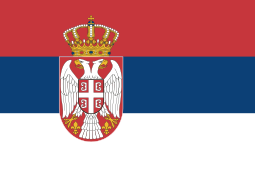Now in its twelfth year, Class 46 is dedicated to European trade mark law and practice. This weblog is written by a team of enthusiasts who want to spread the word and share their thoughts with others.
Click here subscribe for free.
Who we all are...
New Trade Mark Law in force in Serbia
On 1 February 2020, the new Trade Mark Law came into force in Serbia. The Law further harmonises the Serbian trade mark legislation with that of the European Union, in particular with the Harmonisation Directive 2015/2436 and the Enforcement Directive 2004/48 with the aim to close chapter 7 of the EU accession negotiations relating to IP. Gordana Pavlovic outlines the main changes.
 The Trade Mark Law introduces opposition proceedings, in combination with ex officio examination on absolute and relative grounds – the latter being the system that the Serbian IP Office has followed for years. Trade mark applications are first examined on absolute and relative grounds and, if found suitable for registration, they are published in the Intellectual Property Gazette for opposition purposes. The deadline for opposition is three months from publication date. If the applicant does not respond, the opposition is automatically accepted. The Law provides for a maximum cooling-off period of 24 months.
The Trade Mark Law introduces opposition proceedings, in combination with ex officio examination on absolute and relative grounds – the latter being the system that the Serbian IP Office has followed for years. Trade mark applications are first examined on absolute and relative grounds and, if found suitable for registration, they are published in the Intellectual Property Gazette for opposition purposes. The deadline for opposition is three months from publication date. If the applicant does not respond, the opposition is automatically accepted. The Law provides for a maximum cooling-off period of 24 months.
The decisions of the Serbian IP Office can be challenged by filing an administrative lawsuit before the Administrative Court. The new law abandons the possibility of appealing to the Board of Appeals at the Ministry of Education. The decisions of the Administrative Courts can be further challenged in revision proceedings before the Serbian Supreme Court of Cassation.
Like the old Law, the new Law provides for the mandatory use of trade marks. Third parties can challenge a trade mark in case of unjustified non-use during a period of five years starting from the registration date or the date of last use. The novelty is that, in case of cancellation for non-use, the trade mark ceases to be valid on the date of filing of the non-use cancellation action. In the past, trade marks ceased to be valid on the date of expiry of the five-year period (from the registration date, respectively from the date of last use). Use of an earlier trade mark is also required in opposition/invalidation/infringement actions, but only if the trade mark was registered for longer than five years and if the adversary raises an issue of use. If this issue is raised in the context of a trade mark infringement action before the Court, the defendant will be directed to challenge the plaintiff’s trade mark by way of a non-use cancellation action before the IP Office.
Trade mark enforcement is improved under the new Law. The Law features detailed provisions on the collection of evidence, preliminary injunctions, the securing of evidence and the calculation of damages and provides for liability for intermediaries. Further, the Law introduces a provision allowing trade mark owners to prohibit the use of their trade mark in comparative advertising in a manner which is contrary to law. The statute of limitation remains three years from the date on which the trade mark owner became aware of the infringement and the identity of the infringer, and five years from the date of the infringement. The novelty is that, in case of continuous infringement, the five-year term is calculated from the date of the last infringement, which is a welcome change.
The Law re-introduces a provision that a trade mark owner can prohibit not only the import and export of infringing goods, but also their transit through Serbia. In the past, the Serbian trade mark legislation provided for the protection of trade marks against goods in transit but, following changes in the European legislation, this protection was removed from the Serbian legislation. The re-introduction of this provision is a welcome move.
The less welcome move is that the Law replaces national exhaustion by international exhaustion, which will change into European exhaustion only when Serbia joins the European Union. A trade mark owner can oppose commercialization of goods where it has legitimate reasons for that and especially where the condition of the goods is changed or impaired after they have been put on the market.
The Serbian IP Office is currently working on trade mark applications filed before 1 February 2020. These are examined under the old Law and are not published for opposition. So far there have been just a few trade mark applications which were published for opposition purposes. They were all filed after 1 February 12020 and examined in accelerated procedure. It will likely take another two to three months before the Serbian IP Office starts publishing applications for opposition purposes on a larger scale.
Gordana Pavlovic, Cabinet Pavlovic East Europe, Brussels and Belgrade. The author is a member of the MARQUES Famous and Well-Known Marks Team
Posted by: Blog Administrator @ 13.29Tags: Serbia, Enforcement Directive, Directive 2015/2436,


 Sharing on Social Media? Use the link below...
Sharing on Social Media? Use the link below...Perm-A-Link: https://www.marques.org/blogs/class46?XID=BHA4835

